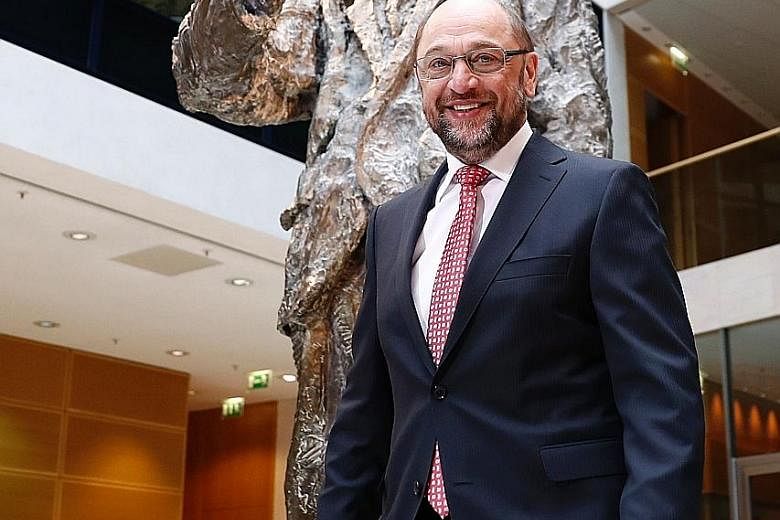At first glance, Mr Martin Schulz appears to be a very unlikely politician in Germany, a country which is known for its discipline and prizes higher academic achievements and experience.
After all, he is a former alcoholic who has neither completed his Abitur (equivalent to the A levels in Germany) nor held a seat in Germany's Parliament.
Yet Mr Schulz has not only risen to head the European Parliament, but is also now the man with the best chance of dethroning Chancellor Angela Merkel in Germany's general election in September.
After the unpopular Social Democrat Party (SPD) chief Sigmar Gabriel surprisingly said he would give up the party's top post, Mr Schulz got into the driver's seat - a move that dramatically reversed the party's fortunes.
Barely a few weeks back, all signs were pointing to a humiliating defeat for the SPD in the Sept 24 polls.
With support for the party falling to as little as 21 per cent - the lowest since the last elections in 2013, speculation was rife that Dr Merkel's centre-right Christian alliance would once again top the vote.
But after Mr Schulz's return to Berlin from Brussels, the SPD's popularity has shot up. Last week, one survey even showed the party 1 percentage point ahead of Dr Merkel's Christian Democratic Union (CDU) and its Bavarian allies, the Christian Social Union (CSU).
Polls pitting the candidates against each other were even more dramatic, including one showing Mr Schulz, 61, clinching 50 per cent while Dr Merkel, 62, lagged with 34 per cent, prompting German media to ask if the European Union veteran would be the next chancellor.
So who is this new hope of Germany's left who has emerged to pose a serious challenge to Dr Merkel, once seen as alternativlos (without alternative in German)?
Born in 1955, Mr Schulz was the youngest of five children, and grew up around Hehlrath, close to the German-Dutch-Belgian borders.
His father was a police officer, and his mother a founding member of the CDU in the western German town of Wuerselen.
Mr Schulz did not share his mother's conservative political leanings, and instead joined the SPD when he was 19.
Performing poorly in mathematics, he left school without completing the Abitur. He harboured hopes of becoming a professional footballer, but an injury halted those ambitions.
The young man sank into alcoholism until 1980, when he decided he would no longer have another drop.
Two years later, he opened a bookstore which he ran for 12 years.
His lack of higher education had led a member from the populist anti- immigration AfD party to mock that: "Madam Merkel has a degree and a doctorate title and is still unable to lead this country. What can we expect from a trained bookseller?"
Yet Mr Schulz is not only extraordinarily well-read, but also a veritable polyglot versed in six languages - besides German, he speaks English, French, Italian, Spanish and Dutch.
Crucially, he is harnessing what appeared at first glance to be disadvantages to appeal to the masses.
"What have I not been accused of? That I have no Abitur, never went to university and that I come from the province," he bellowed in a speech after announcing his bid for Germany's top job.
"From what I understand, a chancellor must not only show understanding but also deep empathy for the daily worries, for the hopes as well as for the fears of all people."
He also refers openly to his past trouble with drink: "I know what it means to go off the rails. I also know how good it feels to have family and friends catch you and give you a second chance."
To those who question his credentials in German politics - he has only been a mayor in Wuerselen, population 40,000, before heading off to Brussels - he retorts: "You won't find real life in the Bundestag. You'll find it in city halls."
Finance Minister Wolfgang Schaeuble, a close ally of Dr Merkel, nevertheless pointed out that "Mr Schulz is no underdog who just emerged from a forest somewhere".
"The man has been sitting in European Parliament for decades, very lately as president. If that is no establishment, then what is?" asked Mr Schaeuble in an interview with Spiegel magazine.
First elected to the European Parliament in 1994, Mr Schulz was elected to become its president in 2012. Despite his long years and high-profile job in Brussels, few German voters know of Mr Schulz's views on potential explosive domestic issues - be it whether to impose an upper limit on refugees or whether wealth taxes should be imposed.
Observers believe the fact that he has stayed above the fray of German domestic politics has given the impression he is a fresh face amid growing voter fatigue for Dr Merkel, who has been in power for 11 years.
Brussels had always been viewed somewhat sceptically in Germany as a place where parties tend to send politicians who do not quite make it at home. But after Brexit and Mr Donald Trump's win in the United States, Mr Schulz's pro-European stance and experience could turn out to be a selling point as there is real fear that the European project could disintegrate.
"He will battle nationalism and campaign for a strong, united Europe. Would that prove a draw? That's a risk. But if there is someone who really ticks for Europe and who can stand for it with his own story, then it is Martin Schulz," said the Frankfurter Allgemeine Zeitung daily.
On the Internet at least, that commitment to Europe has earned Mr Schulz a fan following, with some circulating memes of him bearing the acronym "Mega" - Make Europe Great Again.

